Nerine Dorman's Blog, page 58
September 10, 2014
Colossus by Alexander Cole #military #historical #review
Title:
Colossus
Author: Alexander Cole
Publisher: Corvus, 2014
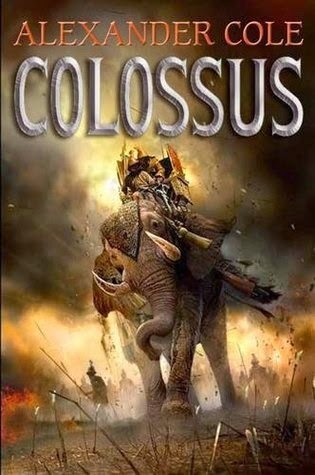 Many great stories begin when an author asks “What if…” and Colossus by Alexander Cole is one of those. In this case, Cole’s question is: “What if Alexander the Great survives an attempt on his life in 323 BC?” and we go from there, as Alexander casts his eye towards Carthage and, eventually, Europe.
Many great stories begin when an author asks “What if…” and Colossus by Alexander Cole is one of those. In this case, Cole’s question is: “What if Alexander the Great survives an attempt on his life in 323 BC?” and we go from there, as Alexander casts his eye towards Carthage and, eventually, Europe.
Central to the story is the role Alexander’s war elephants play in this alternative history, which is told primarily from the viewpoints of Gajendra, who starts out as merely an elephant boy, and Mara, the daughter of the Carthaginian general Hanno. The elephant, Colossus, is as his name suggests, massive, and only Gajendra can control him. This enigmatic beast also displays quirks, which make for quite a number of fascinating scenes; in fact I would have loved to have seen more involving the pachyderms.
Gajendra is ambitious, and will go to great lengths to prove his worth. His work with the war elephants lends Alexander a great advantage in battle, and he soon enjoys a meteoric rise within the ranks of the army. This does not, however, come without cost. Alexander is painted out as a capricious, often fickle man, who is prone to discarding his favourites at whim as fast as he elevates them in status. Gajendra’s success may well prove ephemeral.
Mara has suffered great personal loss and seeks solace as a priestess of the goddess Tanith. When Carthage falls, Mara must disguise herself as a boy in order to avoid the inevitable fate many women suffer during war times. Her path crosses Gajendra’s and though their friendship is far from smooth, their dynamics are nonetheless engaging.
While this novel is mostly military fiction, with focus on tactics, there are some romantic elements. I found myself almost unconsciously wanting to compare this to the writings of Mary Renault, in which case Cole’s prose falls short of that benchmark. Cole’s decision to write in third person present tense is jarring at times, the narration clunky; the overall offering could have been a bit more polished.
That being said, this is still an enjoyable tale and is filled with interesting characters (including a little person, which should please fans of Tyrion Lannister), as well as plenty of action. Lovers of historical and military fiction will be in for a perfectly satisfying read.
Author: Alexander Cole
Publisher: Corvus, 2014
 Many great stories begin when an author asks “What if…” and Colossus by Alexander Cole is one of those. In this case, Cole’s question is: “What if Alexander the Great survives an attempt on his life in 323 BC?” and we go from there, as Alexander casts his eye towards Carthage and, eventually, Europe.
Many great stories begin when an author asks “What if…” and Colossus by Alexander Cole is one of those. In this case, Cole’s question is: “What if Alexander the Great survives an attempt on his life in 323 BC?” and we go from there, as Alexander casts his eye towards Carthage and, eventually, Europe.Central to the story is the role Alexander’s war elephants play in this alternative history, which is told primarily from the viewpoints of Gajendra, who starts out as merely an elephant boy, and Mara, the daughter of the Carthaginian general Hanno. The elephant, Colossus, is as his name suggests, massive, and only Gajendra can control him. This enigmatic beast also displays quirks, which make for quite a number of fascinating scenes; in fact I would have loved to have seen more involving the pachyderms.
Gajendra is ambitious, and will go to great lengths to prove his worth. His work with the war elephants lends Alexander a great advantage in battle, and he soon enjoys a meteoric rise within the ranks of the army. This does not, however, come without cost. Alexander is painted out as a capricious, often fickle man, who is prone to discarding his favourites at whim as fast as he elevates them in status. Gajendra’s success may well prove ephemeral.
Mara has suffered great personal loss and seeks solace as a priestess of the goddess Tanith. When Carthage falls, Mara must disguise herself as a boy in order to avoid the inevitable fate many women suffer during war times. Her path crosses Gajendra’s and though their friendship is far from smooth, their dynamics are nonetheless engaging.
While this novel is mostly military fiction, with focus on tactics, there are some romantic elements. I found myself almost unconsciously wanting to compare this to the writings of Mary Renault, in which case Cole’s prose falls short of that benchmark. Cole’s decision to write in third person present tense is jarring at times, the narration clunky; the overall offering could have been a bit more polished.
That being said, this is still an enjoyable tale and is filled with interesting characters (including a little person, which should please fans of Tyrion Lannister), as well as plenty of action. Lovers of historical and military fiction will be in for a perfectly satisfying read.
Published on September 10, 2014 11:28
September 9, 2014
Quick update, September 2014
 Basically, I’m tardy, and I haven’t actually done a proper blog about some of my recent doings. I keep meaning to, but then invariably something else comes up.
Basically, I’m tardy, and I haven’t actually done a proper blog about some of my recent doings. I keep meaning to, but then invariably something else comes up.First on the agenda is that The Guardian’s Wyrd now has its print version available overseas and here in South Africa. If you’re in Cape Town on September 27, do join us at the launch/signing thingie, which will be held at Metal Machine in the CBD. Do RSVP over at the Facebook page so I can decide how many cupcakes to order.
Daniël Hugo and I will be available to sign copies, so you can be a proud owner of a collector’s issue at the hugely discounted price of R80 a copy. How many opportunities like this will exist, where you can own a copy that has both author and illustrator’s signatures within?
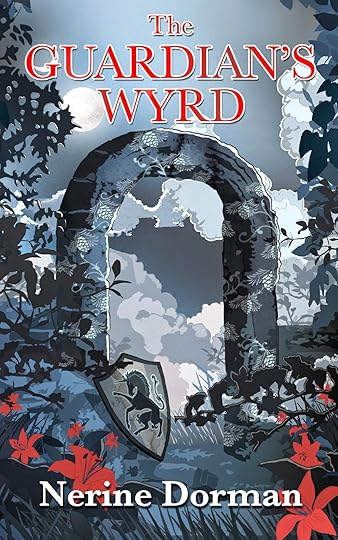 Don’t forget that the ebook version is available from Amazon, Kobo and Kalahari.
Don’t forget that the ebook version is available from Amazon, Kobo and Kalahari.Dawn’s Bright Talons is hitting the mark with readers, some of whom have even claimed that I nearly caused them to miss their stops while they were travelling by train. At the time of writing, I am busy proofing the print version, which should be available soon.
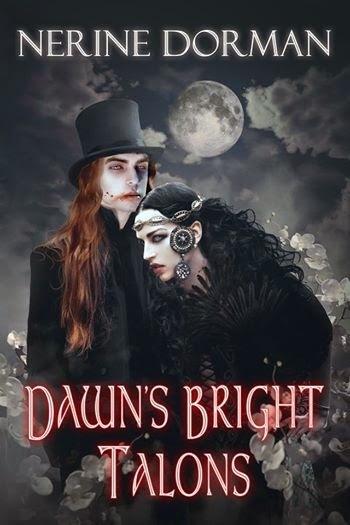 One of my favourite authors ever – Storm Constantine – has graciously agreed to writing a blurb, and I’m over the moon with what she’s had to say:
One of my favourite authors ever – Storm Constantine – has graciously agreed to writing a blurb, and I’m over the moon with what she’s had to say:Nerine Dorman's bright clear prose is at the forefront of modern fantasy
I’m really looking forward to holding physical copies of this novel, as this is one of my “heart” projects. If, however, you’re yet to feed your chosen reading device, Dawn’s Bright Talons is available in a range of formats from the likes of Amazon, Kobo and Smashwords.
 I’ve also recently collected a few of my short stories that have slipped between the cracks. Lost Children is the result, and in this slim volume you’ll find a little bit of everything, from fantasy to out-and-out horror. At the time of writing, I’ve yet to put up the print version, but you can purch
I’ve also recently collected a few of my short stories that have slipped between the cracks. Lost Children is the result, and in this slim volume you’ll find a little bit of everything, from fantasy to out-and-out horror. At the time of writing, I’ve yet to put up the print version, but you can purchase digital copies at Amazon, Kobo and Smashwords.
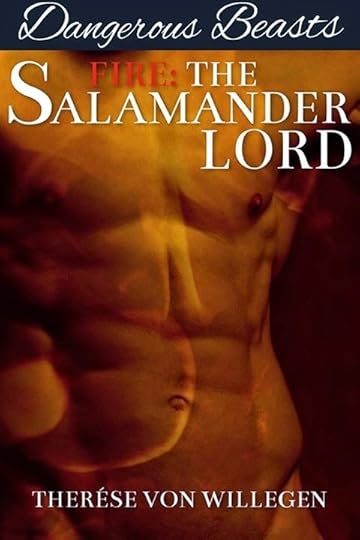 Last, but not least, my Dangerous Beasts stories are underway (writing as Therése von Willegen, of course) and if you’re looking for fantasy that’s a bit… erm… saucy… well… There you go, Killer Torsos available at Amazon, Kobo and Smashwords.
Last, but not least, my Dangerous Beasts stories are underway (writing as Therése von Willegen, of course) and if you’re looking for fantasy that’s a bit… erm… saucy… well… There you go, Killer Torsos available at Amazon, Kobo and Smashwords.That’s the gist of it. Editing-wise I’m busy with some super projects, which are keeping me out of mischief but are making my dark, twisted little heart very happy, even if I’m not able to devote more time to my actual writing. But more on that later.
Published on September 09, 2014 13:56
September 8, 2014
Betrayal's Shadow by Dave-Brendon de Burgh #fantasy #review
Title:
Betrayal’s Shadow (book one of the Mahaelian Chronicles)
Author: Dave-Brendon de Burgh
Publisher: Fox & Raven, 2014
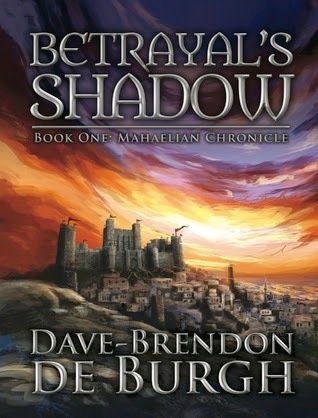 Exciting things are happening for genre fiction in South Africa. Not only are locals making waves overseas, but we can now celebrate yet another fantasy author to make his debut. Betrayal’s Shadow is book one of Pretoria-based Dave-Brendon de Burgh’s Mahaelian Chronicles. In addition to this, he has also released a prequel short story, A Song of Sacrifice, which is available electronically.
Exciting things are happening for genre fiction in South Africa. Not only are locals making waves overseas, but we can now celebrate yet another fantasy author to make his debut. Betrayal’s Shadow is book one of Pretoria-based Dave-Brendon de Burgh’s Mahaelian Chronicles. In addition to this, he has also released a prequel short story, A Song of Sacrifice, which is available electronically.
Much like Steven Erikson’s epics, which De Burgh cites as among his influences, the story is told by a large cast of assorted characters. We are introduced to High General Brice Serholm; the Blade Knight Alun; the royal courtesan Seira; the Elvayn Khyber; scheming mastermind Cobinian; King Jarlath, who possesses near godlike powers – but at a price; and Del’Ahrid, an ambitious first advisor to the king.
Throw all these folks together and you have the ingredients for a suitably violent, intrigue-soaked plot. All characters have ambitions and secrets, which lead them into conflict as a bigger, ages-old saga plays itself out.
De Burgh throws readers right into the thick of things – a quality I appreciate, considering the fantasy genre’s tendency to indulge in exposition. Readers are faced with events that transpire after a war between humans and an elf-like, magic-wielding race known as the Elvayn. The latter have been reduced to slave status, but King Jarlath has plans for them, which may not be to the liking of those who prefer the status quo.
Battle-scarred Alun and young Khyber must both learn to work with their powers, for each has a role to play, and greater threat to face when the zombie-esque Reavers make their first appearance. For those who’d like a little back story, do pick up the prequel, which will help clarify events occurring in book one.
While De Burgh is definitely a South African voice in fantasy to keep an eye on, both novel and prequel could have benefitted from more stringent editing, not only to catch a number typos, but perhaps also to develop some of the characters further. At times I felt his writing flowed a bit too fast, which begged for deeper insights into characters’ motivations, especially with the large cast in this book.
That being said, this is still a worthy read, which should appeal to those who enjoy epic fantasy with a high body count, mounting tension and a fascinating setting.
Author: Dave-Brendon de Burgh
Publisher: Fox & Raven, 2014
 Exciting things are happening for genre fiction in South Africa. Not only are locals making waves overseas, but we can now celebrate yet another fantasy author to make his debut. Betrayal’s Shadow is book one of Pretoria-based Dave-Brendon de Burgh’s Mahaelian Chronicles. In addition to this, he has also released a prequel short story, A Song of Sacrifice, which is available electronically.
Exciting things are happening for genre fiction in South Africa. Not only are locals making waves overseas, but we can now celebrate yet another fantasy author to make his debut. Betrayal’s Shadow is book one of Pretoria-based Dave-Brendon de Burgh’s Mahaelian Chronicles. In addition to this, he has also released a prequel short story, A Song of Sacrifice, which is available electronically.Much like Steven Erikson’s epics, which De Burgh cites as among his influences, the story is told by a large cast of assorted characters. We are introduced to High General Brice Serholm; the Blade Knight Alun; the royal courtesan Seira; the Elvayn Khyber; scheming mastermind Cobinian; King Jarlath, who possesses near godlike powers – but at a price; and Del’Ahrid, an ambitious first advisor to the king.
Throw all these folks together and you have the ingredients for a suitably violent, intrigue-soaked plot. All characters have ambitions and secrets, which lead them into conflict as a bigger, ages-old saga plays itself out.
De Burgh throws readers right into the thick of things – a quality I appreciate, considering the fantasy genre’s tendency to indulge in exposition. Readers are faced with events that transpire after a war between humans and an elf-like, magic-wielding race known as the Elvayn. The latter have been reduced to slave status, but King Jarlath has plans for them, which may not be to the liking of those who prefer the status quo.
Battle-scarred Alun and young Khyber must both learn to work with their powers, for each has a role to play, and greater threat to face when the zombie-esque Reavers make their first appearance. For those who’d like a little back story, do pick up the prequel, which will help clarify events occurring in book one.
While De Burgh is definitely a South African voice in fantasy to keep an eye on, both novel and prequel could have benefitted from more stringent editing, not only to catch a number typos, but perhaps also to develop some of the characters further. At times I felt his writing flowed a bit too fast, which begged for deeper insights into characters’ motivations, especially with the large cast in this book.
That being said, this is still a worthy read, which should appeal to those who enjoy epic fantasy with a high body count, mounting tension and a fascinating setting.
Published on September 08, 2014 11:30
September 4, 2014
Empress by Karen Miller #fantasy #review
Title: Empress (The Godspeaker Trilogy #1)
Author: Karen Miller
Publisher: Hatchette Digital, 2007
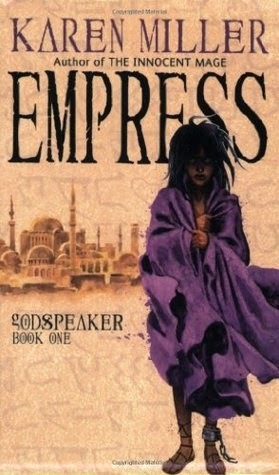 I’m going to start by saying that this book is not for everyone, especially judging by the reviews that it has already received. Many hated it enough to spew some truly vituperative opinions. Plainly put, there are a number of reasons why readers would put the hate on.
I’m going to start by saying that this book is not for everyone, especially judging by the reviews that it has already received. Many hated it enough to spew some truly vituperative opinions. Plainly put, there are a number of reasons why readers would put the hate on.
First reason: Hekat. She starts out as the unwanted, unloved spawn of a goatherd in a village where women are little better than livestock themselves. In fact, Hekat has no name until she is sold to slavers. Hekat can be forgiven, in that regard, for not knowing love. But as for blind ambition and religious fervour, she has that in abundance. Her survival instinct is strong and she isn’t afraid of using every opportunity to better herself. I have to hand it to Karen Miller. Hekat could not have been an easy character to write because she has few, if any redeeming qualities. Even the love she feels for one of her sons smatters of obsession.
I often wondered how many of Hekat’s actions were taken out of her ability to lie to herself about what she *thought* the god of Mijak wanted instead of that which was truly just. Hekat murders to get what she wants, which is to stand as supreme ruler of a united nation. On one hand, her meteoric rise to power is fascinating to watch, and in that sense she is engaging. The fact that she won’t allow her lowly origins or gender to stand in her way is commendable, even if her methods are distasteful. She is so convinced – utterly so – of her right to power, that she won’t let anything or anyone stand in her way.
Vortka was taken as a slave at the same time that Hekat was, and was chosen to serve the god. Though the religion of Mijak is cruel and bloodthirsty, requiring much sacrifice, Vortka however sees another aspect of the god – that of love and mercy. In that, he stands as Hekat’s opposite in many things, and tempers many of her harsher judgments, though he himself is powerless to stop her from making her more rash decisions. He is nonetheless complicit to her wrongdoings, blinded by his adoration of her.
Other characters also find themselves hampered by their love or hate of Hekat. Her sons, the priest Nagarak, and all to a degree are but a means to an end for her. There really is little to like about her, even if she possesses the vision to unite a nation of warring factions.
At the heart of this novel, and perhaps the reason why I feel it is so good, is the depiction of religion in the hands of people, and how they are able to transform it into a tool for good and for evil. Human interpretation of divine will is depicted in its subjectivity, making the readers aware of this danger when people allow their personal whims free rein – especially catastrophic when these same people are in positions of power.
And Hekat does become drunk on her power.
Other aspects to mention include the setting, which evokes the exotic – somewhat a blend of the Middle East with Asian Huns. If you liked the way GRRM wrote about the Dothraki, then the nation of Mijak will hit the spot.
Readers who are disturbed by graphic depictions of violence and animal cruelty had best avoid this novel. What I appreciated about Empress was the setting and the subject matter – vastly different from stock standard fantasy. This sort of culture shock might not be for everyone. In this regard Empress is a challenging but rewarding read, and I am looking forward to the novels that follow.
Author: Karen Miller
Publisher: Hatchette Digital, 2007
 I’m going to start by saying that this book is not for everyone, especially judging by the reviews that it has already received. Many hated it enough to spew some truly vituperative opinions. Plainly put, there are a number of reasons why readers would put the hate on.
I’m going to start by saying that this book is not for everyone, especially judging by the reviews that it has already received. Many hated it enough to spew some truly vituperative opinions. Plainly put, there are a number of reasons why readers would put the hate on.First reason: Hekat. She starts out as the unwanted, unloved spawn of a goatherd in a village where women are little better than livestock themselves. In fact, Hekat has no name until she is sold to slavers. Hekat can be forgiven, in that regard, for not knowing love. But as for blind ambition and religious fervour, she has that in abundance. Her survival instinct is strong and she isn’t afraid of using every opportunity to better herself. I have to hand it to Karen Miller. Hekat could not have been an easy character to write because she has few, if any redeeming qualities. Even the love she feels for one of her sons smatters of obsession.
I often wondered how many of Hekat’s actions were taken out of her ability to lie to herself about what she *thought* the god of Mijak wanted instead of that which was truly just. Hekat murders to get what she wants, which is to stand as supreme ruler of a united nation. On one hand, her meteoric rise to power is fascinating to watch, and in that sense she is engaging. The fact that she won’t allow her lowly origins or gender to stand in her way is commendable, even if her methods are distasteful. She is so convinced – utterly so – of her right to power, that she won’t let anything or anyone stand in her way.
Vortka was taken as a slave at the same time that Hekat was, and was chosen to serve the god. Though the religion of Mijak is cruel and bloodthirsty, requiring much sacrifice, Vortka however sees another aspect of the god – that of love and mercy. In that, he stands as Hekat’s opposite in many things, and tempers many of her harsher judgments, though he himself is powerless to stop her from making her more rash decisions. He is nonetheless complicit to her wrongdoings, blinded by his adoration of her.
Other characters also find themselves hampered by their love or hate of Hekat. Her sons, the priest Nagarak, and all to a degree are but a means to an end for her. There really is little to like about her, even if she possesses the vision to unite a nation of warring factions.
At the heart of this novel, and perhaps the reason why I feel it is so good, is the depiction of religion in the hands of people, and how they are able to transform it into a tool for good and for evil. Human interpretation of divine will is depicted in its subjectivity, making the readers aware of this danger when people allow their personal whims free rein – especially catastrophic when these same people are in positions of power.
And Hekat does become drunk on her power.
Other aspects to mention include the setting, which evokes the exotic – somewhat a blend of the Middle East with Asian Huns. If you liked the way GRRM wrote about the Dothraki, then the nation of Mijak will hit the spot.
Readers who are disturbed by graphic depictions of violence and animal cruelty had best avoid this novel. What I appreciated about Empress was the setting and the subject matter – vastly different from stock standard fantasy. This sort of culture shock might not be for everyone. In this regard Empress is a challenging but rewarding read, and I am looking forward to the novels that follow.
Published on September 04, 2014 04:00
September 3, 2014
Hearing Helen by Carolyn Morton #YA #review
Title:
Hearing Helen
Author: Carolyn Morton
Publisher: Human & Rousseau, 2013
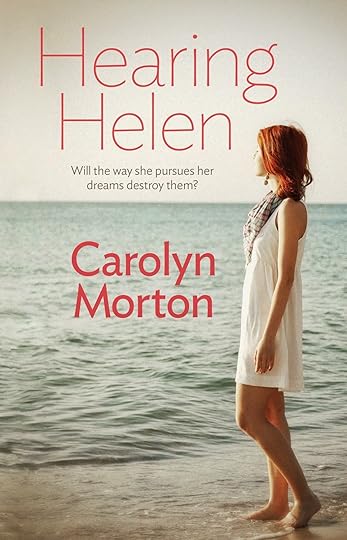 Big disclaimer: contemporary YA is not my usual genre, but Carolyn Morton won me over within the first few pages, with just the right touches. One of the issues that I have with YA is that main characters often seem to exist in a little solipsistic bubble. And yes, while I agree that teens are often self-centred, they do have many concerns beyond the “me-me-me”. Morton gets the balance just right.
Big disclaimer: contemporary YA is not my usual genre, but Carolyn Morton won me over within the first few pages, with just the right touches. One of the issues that I have with YA is that main characters often seem to exist in a little solipsistic bubble. And yes, while I agree that teens are often self-centred, they do have many concerns beyond the “me-me-me”. Morton gets the balance just right.
Helen is the youngest child of two, and she feels as if her parents are ignoring her in favour of her older brother Hank, who can do no wrong in their eyes, it would seem. Their family has fallen on tough times, and both parents are overworked trying to make ends meet. They appear to have pinned their hopes on Hank, who is gifted musically and whom they think has a more than good chance of winning a prestigious music competition that promises a large cash prize.
Though Hank’s winning is not in the bag, their parents clutch at this straw, on the off chance that it will provide a better future, as if it’s the only outcome that will save them. If Hank attains this goal, he will be able to study medicine and his parents out financially. At least that’s the plan. No pressure, right?
Poor Helen comes second. Like her brother, she’s gifted musically, but she’s not as good as her older sibling. She’s desperate for some praise from her folks, but they’re too preoccupied and exhausted to realise that she’s asking for some recognition.
Added to the mix is the enigmatic Madame Pandora, Helen and Hank’s music teacher, who berates Helen for not having the heart in her playing – and part of this story is about Helen understanding her motivations for playing music.
Yet this is also a book about friendship. There is a slight hint of a love triangle, but it’s not overbaked. Thank goodness. Helen is besties with June, and Kean, the boy Helen’s a wee bit infatuated with, has eyes only for June. Throw in a life skills project at school where these three friends have to care for a crying, hiccupping baby doll, and you have a recipe for some interesting dynamics.
Helen mostly has to work out her priorities, and Morton allows the story to unfold in a suitably satisfying way. This novel is a light read, so if you’re looking for something that lays on the wangst and grit, then this is probably not for you. Morton writes from the heart, but in a way that is not overly sentimental or too preachy. I particularly liked how she described Helen’s musical endeavours, which Morton brought across with authenticity (and reminded me of my own days suffering piano at high school).
All in all, this book is best summed up as a sweet, short and uplifting tale about young people who must decide to be honest with themselves and others, about what they really want in life. And then having the gumption to bide by their decisions.
Author: Carolyn Morton
Publisher: Human & Rousseau, 2013
 Big disclaimer: contemporary YA is not my usual genre, but Carolyn Morton won me over within the first few pages, with just the right touches. One of the issues that I have with YA is that main characters often seem to exist in a little solipsistic bubble. And yes, while I agree that teens are often self-centred, they do have many concerns beyond the “me-me-me”. Morton gets the balance just right.
Big disclaimer: contemporary YA is not my usual genre, but Carolyn Morton won me over within the first few pages, with just the right touches. One of the issues that I have with YA is that main characters often seem to exist in a little solipsistic bubble. And yes, while I agree that teens are often self-centred, they do have many concerns beyond the “me-me-me”. Morton gets the balance just right.Helen is the youngest child of two, and she feels as if her parents are ignoring her in favour of her older brother Hank, who can do no wrong in their eyes, it would seem. Their family has fallen on tough times, and both parents are overworked trying to make ends meet. They appear to have pinned their hopes on Hank, who is gifted musically and whom they think has a more than good chance of winning a prestigious music competition that promises a large cash prize.
Though Hank’s winning is not in the bag, their parents clutch at this straw, on the off chance that it will provide a better future, as if it’s the only outcome that will save them. If Hank attains this goal, he will be able to study medicine and his parents out financially. At least that’s the plan. No pressure, right?
Poor Helen comes second. Like her brother, she’s gifted musically, but she’s not as good as her older sibling. She’s desperate for some praise from her folks, but they’re too preoccupied and exhausted to realise that she’s asking for some recognition.
Added to the mix is the enigmatic Madame Pandora, Helen and Hank’s music teacher, who berates Helen for not having the heart in her playing – and part of this story is about Helen understanding her motivations for playing music.
Yet this is also a book about friendship. There is a slight hint of a love triangle, but it’s not overbaked. Thank goodness. Helen is besties with June, and Kean, the boy Helen’s a wee bit infatuated with, has eyes only for June. Throw in a life skills project at school where these three friends have to care for a crying, hiccupping baby doll, and you have a recipe for some interesting dynamics.
Helen mostly has to work out her priorities, and Morton allows the story to unfold in a suitably satisfying way. This novel is a light read, so if you’re looking for something that lays on the wangst and grit, then this is probably not for you. Morton writes from the heart, but in a way that is not overly sentimental or too preachy. I particularly liked how she described Helen’s musical endeavours, which Morton brought across with authenticity (and reminded me of my own days suffering piano at high school).
All in all, this book is best summed up as a sweet, short and uplifting tale about young people who must decide to be honest with themselves and others, about what they really want in life. And then having the gumption to bide by their decisions.
Published on September 03, 2014 10:23
September 2, 2014
This House is Haunted by John Boyne #review
Title:
This House is Haunted
Author: John Boyne
Publisher: Transworld Publishers, 2013
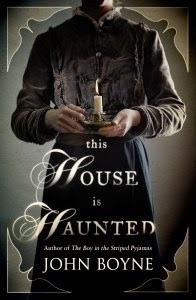 In This House is Haunted, a plain-Jane schoolteacher responds to an urgent advertisement to take up a post in Norfolk as a governess to two children from an obviously wealthy family. At first this career opportunity seems like the answers to Eliza Caine’s prayers, as she’s just lost her father and doesn’t have any other prospects.
In This House is Haunted, a plain-Jane schoolteacher responds to an urgent advertisement to take up a post in Norfolk as a governess to two children from an obviously wealthy family. At first this career opportunity seems like the answers to Eliza Caine’s prayers, as she’s just lost her father and doesn’t have any other prospects.
For some reason, at the age of 21, she’s still unmarried, and whether this is due to a low self-image or whether she’s genuinely hideous, remains for the reader to decide. Personally, I prefer to think that Eliza’s sheltered upbringing has led to her introversion, and living with her elderly father has not helped her cause.
Of course once Eliza arrives at Gaudlin Hall, she is immediately thrust into a supernatural mystery (starting with a pair of ghostly hands trying to shove her under a train on the platform upon her arrival). Being the rational sort, this young woman is not immediately inclined to run screaming, nor does she at first believe that her problems are of a paranormal nature.
Eliza is chiefly concerned that her two charges – the young Isabella and Eustace Westerley – have absent parents, and are growing up isolated in the nearly derelict residence which conveniently has gargoyles on the roof to add to the Gothic mood.
It’s at this point that the story’s wheels come off for me. If you’ve grown up on a steady diet of period dramas and horror films (especially all those cheesy Hammer horrors from the previous century) you’ll quickly pick out nearly every single trope the genre can throw at readers, such as the crumbling mansion with the inexplicable events; suspicious villagers who’re all in on some dreadful secret they won’t share; peculiar children who see dead people; and of course the prerequisite, scary surly groundskeeper.
My feeling is that the author raided those old horror classics for all the scary bits we’ve come to know and expect, and that though these are suited eminently for horror on film, they are not particularly scary when employed in the written word. At least not in the same way that the likes of Stephen King gives me sleepless nights.
Eliza experiences phenomena, and I kept waiting to be scared, but our main character takes things in her stride, and I gained a growing sense, especially when it came to the behaviour of others “in the know” that the author had written other characters to be deliberately mysterious in order to heighten tension. So, to me, this aspect of the book feels contrived.
These things considered, I still enjoyed This House is Haunted, for the same reason that I’m entertained by old-school horror (and here I’m thinking specifically of Guillermo del Torro’s Mama and Don’t be Afraid of the Dark, as well as The Woman in Black, a novel by Susan Hill that was made into a film starring Daniel Radcliffe). None of these offerings are perfect, but they’re still enjoyable.
If you go into This House is Haunted with moments of tongue-in-cheek humour, references to Charles Dickens and typical Gothic novels in mind, then the story might provide perfectly adequate entertainment. Scary, however, it is not, and if you know your tropes well, you’ll see the final outcome arriving from miles away.
John Boyne drops piles of hints from early on that are simple to add together. This results in a story that is to a large extent formulaic, and made me think along the lines of Jane Eyre meets Paranormal Activity.
Author: John Boyne
Publisher: Transworld Publishers, 2013
 In This House is Haunted, a plain-Jane schoolteacher responds to an urgent advertisement to take up a post in Norfolk as a governess to two children from an obviously wealthy family. At first this career opportunity seems like the answers to Eliza Caine’s prayers, as she’s just lost her father and doesn’t have any other prospects.
In This House is Haunted, a plain-Jane schoolteacher responds to an urgent advertisement to take up a post in Norfolk as a governess to two children from an obviously wealthy family. At first this career opportunity seems like the answers to Eliza Caine’s prayers, as she’s just lost her father and doesn’t have any other prospects.For some reason, at the age of 21, she’s still unmarried, and whether this is due to a low self-image or whether she’s genuinely hideous, remains for the reader to decide. Personally, I prefer to think that Eliza’s sheltered upbringing has led to her introversion, and living with her elderly father has not helped her cause.
Of course once Eliza arrives at Gaudlin Hall, she is immediately thrust into a supernatural mystery (starting with a pair of ghostly hands trying to shove her under a train on the platform upon her arrival). Being the rational sort, this young woman is not immediately inclined to run screaming, nor does she at first believe that her problems are of a paranormal nature.
Eliza is chiefly concerned that her two charges – the young Isabella and Eustace Westerley – have absent parents, and are growing up isolated in the nearly derelict residence which conveniently has gargoyles on the roof to add to the Gothic mood.
It’s at this point that the story’s wheels come off for me. If you’ve grown up on a steady diet of period dramas and horror films (especially all those cheesy Hammer horrors from the previous century) you’ll quickly pick out nearly every single trope the genre can throw at readers, such as the crumbling mansion with the inexplicable events; suspicious villagers who’re all in on some dreadful secret they won’t share; peculiar children who see dead people; and of course the prerequisite, scary surly groundskeeper.
My feeling is that the author raided those old horror classics for all the scary bits we’ve come to know and expect, and that though these are suited eminently for horror on film, they are not particularly scary when employed in the written word. At least not in the same way that the likes of Stephen King gives me sleepless nights.
Eliza experiences phenomena, and I kept waiting to be scared, but our main character takes things in her stride, and I gained a growing sense, especially when it came to the behaviour of others “in the know” that the author had written other characters to be deliberately mysterious in order to heighten tension. So, to me, this aspect of the book feels contrived.
These things considered, I still enjoyed This House is Haunted, for the same reason that I’m entertained by old-school horror (and here I’m thinking specifically of Guillermo del Torro’s Mama and Don’t be Afraid of the Dark, as well as The Woman in Black, a novel by Susan Hill that was made into a film starring Daniel Radcliffe). None of these offerings are perfect, but they’re still enjoyable.
If you go into This House is Haunted with moments of tongue-in-cheek humour, references to Charles Dickens and typical Gothic novels in mind, then the story might provide perfectly adequate entertainment. Scary, however, it is not, and if you know your tropes well, you’ll see the final outcome arriving from miles away.
John Boyne drops piles of hints from early on that are simple to add together. This results in a story that is to a large extent formulaic, and made me think along the lines of Jane Eyre meets Paranormal Activity.
Published on September 02, 2014 00:50
September 1, 2014
Finding My Own Way... to happy & gay by Barbara Castle-Farmer #review
Title:
Finding My Own Way… to happy & gay
Author: Barbara Castle-Farmer, 2014
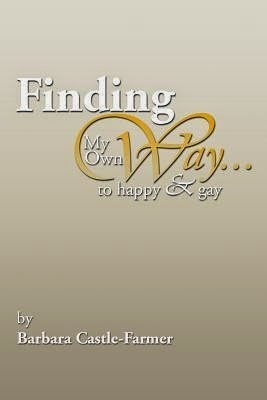 After many years of democracy in a country with possibly one of the most liberal constitution in the world, it can be argued that LGBTI people do not face the same challenges that they did during the apartheid years. Though there are, undeniably, many issues that need to be dealt with, such as corrective rape of black lesbians in townships, we can now walk down the road, hand in hand with our partners; we can adopt children; and we can commit to our loved ones in a legally recognised civil partnership. None of this had been previously possible, and we should never forget that we’ve worked hard to get there.
After many years of democracy in a country with possibly one of the most liberal constitution in the world, it can be argued that LGBTI people do not face the same challenges that they did during the apartheid years. Though there are, undeniably, many issues that need to be dealt with, such as corrective rape of black lesbians in townships, we can now walk down the road, hand in hand with our partners; we can adopt children; and we can commit to our loved ones in a legally recognised civil partnership. None of this had been previously possible, and we should never forget that we’ve worked hard to get there.
What is immediately apparent when one picks up a copy of Finding My Own Way… by Barbara Castle-Farmer, is that she writes from the heart, and has opened a book that is important to read, whether you are gay or straight.
She bravely tells her life story, warts and all, from her earliest days when she had her first inkling that she was somehow different, to her initial explorations in same-sex relationships.
Something to bear in mind is that during the mid-1900s, there were no helpful resources available to LGBT people, who often lived in great isolation. Homosexuality was misunderstood and reviled, and young gay people really had to flounder around in the dark, so to speak, with little or no guidance.
This was an immense challenge that Castle-Farmer faced, especially here in South Africa, where there were so many restrictive laws. Yet this did not stop her from entering into relationships or building a career – and she forged ahead, which is inspiring to read.
Yet this book is more than a memoir. Castle-Farmer dispels many myths, and also serves to impart fascinating and relevant snippets of information at the start of every chapter – drawing one’s attention to important historical details that should not be lost in the mists of time.
Perhaps the only criticism that can be levelled against this book is the fact that there are numerous typographical errors throughout, which should have been picked up by a diligent proofreader. That being said, Castle-Farmer’s writing is thoroughly engaging, and I found that I could not put down this book until it was done. Thank you, lady, for sharing your story, and here’s hoping that it will light the way for others on this path.
Author: Barbara Castle-Farmer, 2014
 After many years of democracy in a country with possibly one of the most liberal constitution in the world, it can be argued that LGBTI people do not face the same challenges that they did during the apartheid years. Though there are, undeniably, many issues that need to be dealt with, such as corrective rape of black lesbians in townships, we can now walk down the road, hand in hand with our partners; we can adopt children; and we can commit to our loved ones in a legally recognised civil partnership. None of this had been previously possible, and we should never forget that we’ve worked hard to get there.
After many years of democracy in a country with possibly one of the most liberal constitution in the world, it can be argued that LGBTI people do not face the same challenges that they did during the apartheid years. Though there are, undeniably, many issues that need to be dealt with, such as corrective rape of black lesbians in townships, we can now walk down the road, hand in hand with our partners; we can adopt children; and we can commit to our loved ones in a legally recognised civil partnership. None of this had been previously possible, and we should never forget that we’ve worked hard to get there.What is immediately apparent when one picks up a copy of Finding My Own Way… by Barbara Castle-Farmer, is that she writes from the heart, and has opened a book that is important to read, whether you are gay or straight.
She bravely tells her life story, warts and all, from her earliest days when she had her first inkling that she was somehow different, to her initial explorations in same-sex relationships.
Something to bear in mind is that during the mid-1900s, there were no helpful resources available to LGBT people, who often lived in great isolation. Homosexuality was misunderstood and reviled, and young gay people really had to flounder around in the dark, so to speak, with little or no guidance.
This was an immense challenge that Castle-Farmer faced, especially here in South Africa, where there were so many restrictive laws. Yet this did not stop her from entering into relationships or building a career – and she forged ahead, which is inspiring to read.
Yet this book is more than a memoir. Castle-Farmer dispels many myths, and also serves to impart fascinating and relevant snippets of information at the start of every chapter – drawing one’s attention to important historical details that should not be lost in the mists of time.
Perhaps the only criticism that can be levelled against this book is the fact that there are numerous typographical errors throughout, which should have been picked up by a diligent proofreader. That being said, Castle-Farmer’s writing is thoroughly engaging, and I found that I could not put down this book until it was done. Thank you, lady, for sharing your story, and here’s hoping that it will light the way for others on this path.
Published on September 01, 2014 13:05
August 31, 2014
Featured author: J Hamlet – The Chaos Theology #1
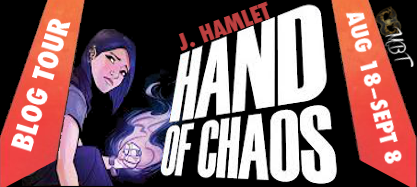
Today I'm playing host to author J Hamlet, author of The Chaos Theology. So, take a look, and check out the Rafflecopter giveaway at the end of this post.
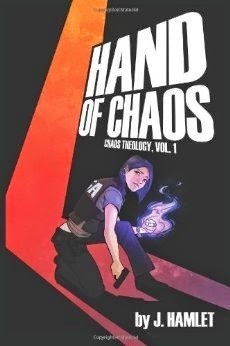 Title: Hand of Chaos
Title: Hand of ChaosSeries: The Chaos Theology #1
Author: J Hamlet
Publication Date: September 4, 2013
Genre: Dark Urban Fantasy
Synopsis
Exhausted, cynical, and confused, Anna is always there to report for duty. She's part of a clandestine government team that defends the nation against supernatural terrorism—a job that understandably leaves her life in shambles and drives her to drink a little more than she should. Toss in a fear of intimacy with a desire to have friends and lovers like a normal person and, well, Anna is a troubled soul wrapped in a special agent with arcane, magical powers. Waking up hungover at five–thirty in the morning with a zombie–infested apartment building in the heart of DC to deal with, she knows she's got the makings of the worst morning possible.
Her team is its own challenge. A battle–scarred Nigerian shaman, a bookish shapeshifter, an inept summoner, and a brilliant but cantankerous wizard round it all out. Her partner, an immortal and cursed Paladin, is the only person she knows more jaded than herself. Getting them all to work together is never easy, with Anna often caught in the cross fire.
Their target, Ethan Morgan, is one pissed off necromancer. His brother was KIA by his own government, the victim of an experimental magical weapon they decided to test on the battlefield. Now bent on revenge and sponsored by one of hell's most powerful demons, Ethan has a plan of his own to make us all pay. Anna and her team are fighting against the wake of destruction, but Ethan is always one step ahead. With the number of bodies he leaves and reanimates growing exponentially, Anna's wondering if they'll stop him before he engulfs everyone in an undead horde.
Buy Links
Amazon | Goodreads
Author Bio
 Everyone needs a hobby. And, like most people, I hope one day that my hobby will liberate me from my mind–numbing day job. I chose writing. Not one of the easier ones. I chose it at the tender age of 14, churning out terrible science fiction novels that heaped on the cliches and barely hidden tropes of all space operas. Thankfully, those creations reside in the prison of an old Commodore 64 hard drive and several 3.5" disks (kids, ask your parents) in a landfill somewhere. And, let me be clear, the world is better for it.
Everyone needs a hobby. And, like most people, I hope one day that my hobby will liberate me from my mind–numbing day job. I chose writing. Not one of the easier ones. I chose it at the tender age of 14, churning out terrible science fiction novels that heaped on the cliches and barely hidden tropes of all space operas. Thankfully, those creations reside in the prison of an old Commodore 64 hard drive and several 3.5" disks (kids, ask your parents) in a landfill somewhere. And, let me be clear, the world is better for it.Along the way, I kept writing. Through college. Through grad school. Through the beginning of my career, such as it is. I like to believe I picked up skills. I wanted to write novels that had things I wanted to see. Hand of Chaos, my debut novel, brings together elements of a spy thriller and a police procedural with dark and urban fantasy. I followed that with Scarred Earth, a serial alien invasion novel I'm releasing entirely through tumblr. I'm probably going about this all wrong, but I don't know any other way.
Social Media Links
Website | Facebook | Twitter | Goodreads | Pinterest | Tumblr
Giveaway: There is a giveaway for this tour. A $50 Amazon/B&N Giftcard or a Book Depository shopping spree of the same value.
Open Internationally. Ends 9/15.
a Rafflecopter giveaway
Published on August 31, 2014 10:51
August 27, 2014
Emperor of Thorns by Mark Lawrence #review
Title:
Emperor of Thorns (#3 of The Broken Empire)
Author: Mark Lawrence
Publisher: Ace, 2013
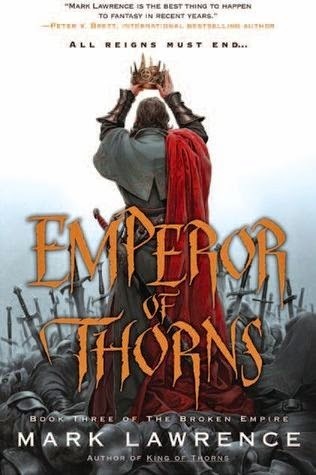 Finally I got to finish this trilogy, and it’s a lovely feeling of completion for someone like me who rarely manages to follow through with a challenge of this nature. Jorg as a character is fascinating. When we meet him in book one, he’s impulsive and prone to perpetrate horrendous acts of violence. Not much has changed by book three, and he still very much possesses the ability to act before he thinks, but his motivations (in his mind) are clearer. Here is a man who cares deeply about two things: his family (latent guilt toward his brother’s death) and also claiming the emperor’s throne. He proves again and again, that he’s not afraid to sacrifice anything and anyone to get what he wants. This might upset some. [Okay, that was totally an understatement but jawellnofine] ← **more laughter**
Finally I got to finish this trilogy, and it’s a lovely feeling of completion for someone like me who rarely manages to follow through with a challenge of this nature. Jorg as a character is fascinating. When we meet him in book one, he’s impulsive and prone to perpetrate horrendous acts of violence. Not much has changed by book three, and he still very much possesses the ability to act before he thinks, but his motivations (in his mind) are clearer. Here is a man who cares deeply about two things: his family (latent guilt toward his brother’s death) and also claiming the emperor’s throne. He proves again and again, that he’s not afraid to sacrifice anything and anyone to get what he wants. This might upset some. [Okay, that was totally an understatement but jawellnofine] ← **more laughter**
While at the start of his journey, he primarily wants the throne simply for the sake of having it (that’s how I see it, at least) his motivations have shifted somewhat near the end. Now Jorg wants that throne because he knows he’s the only one with the will and the knowledge to save the world from certain fiery destruction (possibly also motivated by the fact that he wants to leave some sort of legacy for his son).
As always, Mark Lawrence treads a tricky path with his narrative running on different timelines, with multiple story arcs that cross reference each other. The jumping between past and present will no doubt infuriate readers who like linear stories. At times I felt there was a little withholding of key information, but the pace is so fast, and Jorg is such an unreliable narrator, that I was happy to cling on for the ride.
Jorg is ever the ladies’ man [says the reviewer amid sick laughter], and his relationship with three vastly different (and dangerous) women is complex. Katherine’s fate is still inextricably twined with Jorg’s, bitter as their past grievances are, and Miana is anything but the shy, retiring damsel. As the mother of Jorg’s son, she proves to be every bit as ruthless as the father when it comes to protect family, and as such perfectly complements Jorg. Chella the necromancer is introduced as a viewpoint character, which is a little jarring at first for those of us accustomed to Jorg’s first-person narrative. Her observations are nonetheless key to the story, and offer valuable insight.
As can be expected in one of Lawrence’s novels, bloodshed, carnage and large-scale destruction is never far away. I am also glad that he decided to irrevocably stamp this story with “the end”, and resist the temptation of a drawn-out multi-book series prone to the exhaustion of ever-escalating “too much awesome”.
The resolution of The Broken Empire trilogy is apt. To be honest, I hadn’t been quite sure where Lawrence was going with it, but when it happened, I sat back with a small smile. Jorg is the kind of guy who likes solutions. The only problem is his solutions aren’t always to the liking of the affected parties.
Dear Mark, thank you for showing us Jorg’s world, and I look forward to reading more of your books in the future.
Author: Mark Lawrence
Publisher: Ace, 2013
 Finally I got to finish this trilogy, and it’s a lovely feeling of completion for someone like me who rarely manages to follow through with a challenge of this nature. Jorg as a character is fascinating. When we meet him in book one, he’s impulsive and prone to perpetrate horrendous acts of violence. Not much has changed by book three, and he still very much possesses the ability to act before he thinks, but his motivations (in his mind) are clearer. Here is a man who cares deeply about two things: his family (latent guilt toward his brother’s death) and also claiming the emperor’s throne. He proves again and again, that he’s not afraid to sacrifice anything and anyone to get what he wants. This might upset some. [Okay, that was totally an understatement but jawellnofine] ← **more laughter**
Finally I got to finish this trilogy, and it’s a lovely feeling of completion for someone like me who rarely manages to follow through with a challenge of this nature. Jorg as a character is fascinating. When we meet him in book one, he’s impulsive and prone to perpetrate horrendous acts of violence. Not much has changed by book three, and he still very much possesses the ability to act before he thinks, but his motivations (in his mind) are clearer. Here is a man who cares deeply about two things: his family (latent guilt toward his brother’s death) and also claiming the emperor’s throne. He proves again and again, that he’s not afraid to sacrifice anything and anyone to get what he wants. This might upset some. [Okay, that was totally an understatement but jawellnofine] ← **more laughter**While at the start of his journey, he primarily wants the throne simply for the sake of having it (that’s how I see it, at least) his motivations have shifted somewhat near the end. Now Jorg wants that throne because he knows he’s the only one with the will and the knowledge to save the world from certain fiery destruction (possibly also motivated by the fact that he wants to leave some sort of legacy for his son).
As always, Mark Lawrence treads a tricky path with his narrative running on different timelines, with multiple story arcs that cross reference each other. The jumping between past and present will no doubt infuriate readers who like linear stories. At times I felt there was a little withholding of key information, but the pace is so fast, and Jorg is such an unreliable narrator, that I was happy to cling on for the ride.
Jorg is ever the ladies’ man [says the reviewer amid sick laughter], and his relationship with three vastly different (and dangerous) women is complex. Katherine’s fate is still inextricably twined with Jorg’s, bitter as their past grievances are, and Miana is anything but the shy, retiring damsel. As the mother of Jorg’s son, she proves to be every bit as ruthless as the father when it comes to protect family, and as such perfectly complements Jorg. Chella the necromancer is introduced as a viewpoint character, which is a little jarring at first for those of us accustomed to Jorg’s first-person narrative. Her observations are nonetheless key to the story, and offer valuable insight.
As can be expected in one of Lawrence’s novels, bloodshed, carnage and large-scale destruction is never far away. I am also glad that he decided to irrevocably stamp this story with “the end”, and resist the temptation of a drawn-out multi-book series prone to the exhaustion of ever-escalating “too much awesome”.
The resolution of The Broken Empire trilogy is apt. To be honest, I hadn’t been quite sure where Lawrence was going with it, but when it happened, I sat back with a small smile. Jorg is the kind of guy who likes solutions. The only problem is his solutions aren’t always to the liking of the affected parties.
Dear Mark, thank you for showing us Jorg’s world, and I look forward to reading more of your books in the future.
Published on August 27, 2014 14:02
August 26, 2014
Coercion by Lux Zakari #review
Title:
Coercion
Author: Lux Zakari, 2014
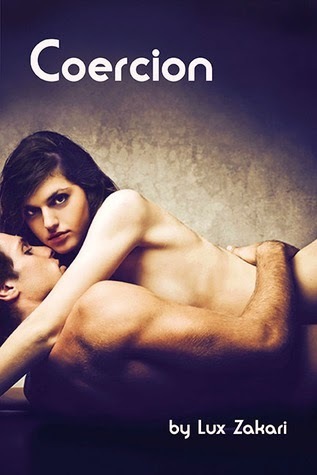 Valerie Mercer has undergone a transformation. No longer labelled as the overweight ugly duckling, she has followed her aunt’s advice and has shed kilos. The only problem is that she’s lost none of her insecurities.
Valerie Mercer has undergone a transformation. No longer labelled as the overweight ugly duckling, she has followed her aunt’s advice and has shed kilos. The only problem is that she’s lost none of her insecurities.
Michael Vartanian doesn’t know what he wants. And his on again, off again relationship with his girlfriend Breeze is a source of great discontent to both of them. Even though he can’t seem to stay away from her, he still has a wandering eye. Also, the thing that I picked up from him is that he purposefully avoids facing up to his own shortcomings. I don’t blame Breeze for treating him the way she does. The boy needs a serious wake-up call.
If you’re looking for a new adult-type romance with a HEA then this is not going to be the story for you. As always, Zakari writes authentic characters who make poor decisions and have to deal with the fallout from their mistakes.
The bottom line is that Valerie’s insecurities mean that Michael basically walks all over her. His blatant callous attitude would send any girl with a shred of self-worth running. Not so with Valerie, who spends months moping after this fiend. A sexy fiend, but a fiend nonetheless. She has no rational explanation as to why she allows him to use her, and she keeps going back for more.
I can understand that this might be a turn-off to some readers who want a gallant badboy type with a good heart. Michael is most emphatically not the man you are looking for.
Their sexual encounters are steamy and illicit, but they are tainted by Michael’s casual cruelty. Valerie makes the prime error of mistaking lust for love, and my heart ached for her even as I wanted to deliver a swift slap to the side of her head.
Yet there is a glimmer of hope. Valerie’s pain is a crucible for her, and although she goes through a difficult time – don’t we all at that age? – she is stronger for it, and I enjoyed seeing her learn to stand her ground.
This isn’t my favourite of Zakari’s writing, but it’s nonetheless still good. There’s a wry, barbed undercurrent that’s present in all her works I’ve read so far, and she weaves an eminently readable slice of life, love and passion.
Author: Lux Zakari, 2014
 Valerie Mercer has undergone a transformation. No longer labelled as the overweight ugly duckling, she has followed her aunt’s advice and has shed kilos. The only problem is that she’s lost none of her insecurities.
Valerie Mercer has undergone a transformation. No longer labelled as the overweight ugly duckling, she has followed her aunt’s advice and has shed kilos. The only problem is that she’s lost none of her insecurities.Michael Vartanian doesn’t know what he wants. And his on again, off again relationship with his girlfriend Breeze is a source of great discontent to both of them. Even though he can’t seem to stay away from her, he still has a wandering eye. Also, the thing that I picked up from him is that he purposefully avoids facing up to his own shortcomings. I don’t blame Breeze for treating him the way she does. The boy needs a serious wake-up call.
If you’re looking for a new adult-type romance with a HEA then this is not going to be the story for you. As always, Zakari writes authentic characters who make poor decisions and have to deal with the fallout from their mistakes.
The bottom line is that Valerie’s insecurities mean that Michael basically walks all over her. His blatant callous attitude would send any girl with a shred of self-worth running. Not so with Valerie, who spends months moping after this fiend. A sexy fiend, but a fiend nonetheless. She has no rational explanation as to why she allows him to use her, and she keeps going back for more.
I can understand that this might be a turn-off to some readers who want a gallant badboy type with a good heart. Michael is most emphatically not the man you are looking for.
Their sexual encounters are steamy and illicit, but they are tainted by Michael’s casual cruelty. Valerie makes the prime error of mistaking lust for love, and my heart ached for her even as I wanted to deliver a swift slap to the side of her head.
Yet there is a glimmer of hope. Valerie’s pain is a crucible for her, and although she goes through a difficult time – don’t we all at that age? – she is stronger for it, and I enjoyed seeing her learn to stand her ground.
This isn’t my favourite of Zakari’s writing, but it’s nonetheless still good. There’s a wry, barbed undercurrent that’s present in all her works I’ve read so far, and she weaves an eminently readable slice of life, love and passion.
Published on August 26, 2014 12:08



